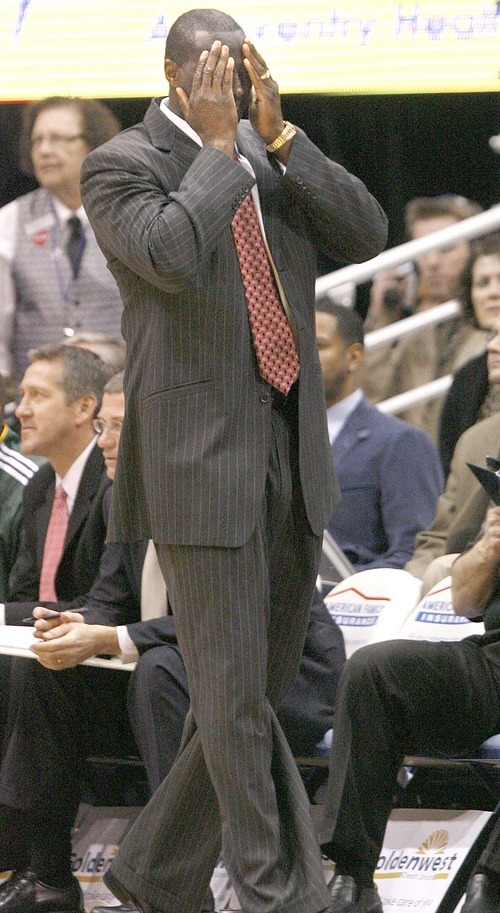This is an archived article that was published on sltrib.com in 2011, and information in the article may be outdated. It is provided only for personal research purposes and may not be reprinted.
Tyrone Corbin should be very happy the Jazz did not make him the team's interim coach in February.
That's not to say his promotion was a mistake, necessarily, because so many factors cloud the judgment of Corbin's work during the past six weeks. Yet with his 5-17 record going into the Jazz's remaining six games, there's no way management could have viewed this trial run as meriting a move from interim to permanent.
Corbin's blunder of not having Paul Millsap intentionally miss a free throw in an eventual overtime loss to New Orleans would be enough reason not to bring him back, under those circumstances. Because he's under contract through 2013, though, the evaluation of Corbin is only beginning.
Once the Jerry Sloan-Phil Johnson administration lasted beyond a certain point, Corbin became the coach-in-waiting. With the team lurching toward the finish line, the issue of whether the organization should have treated the seven-year assistant more skeptically comes into play — although it is moot.
The reality is that, whenever the NBA resumes play after this season, the Jazz will become like every other pro sports franchise and Corbin will be judged like every other coach.
Corbin will be charged with a big share of the Jazz's rebuilding project and will have to show progress. As of now, getting a true read on his coaching ability is difficult, amid injuries and personnel issues that followed the trade of Deron Williams.
Asked if even he can evaluate himself fairly, Corbin laughed and said, "I'm holding that back till later on."
Any judgment of Corbin is "not fair at all," said Jazz swingman C.J. Miles. "He was thrown into a situation that was pretty bad, and then when he had to start coaching the new guys, too, on top of coaching us, it was just tough."
Sloan won only four of his last 14 games, and the team was in turmoil. So the review of Corbin's work comes down to two basic issues: Whether the Williams trade and the Jazz's injuries should excuse his record and whether losing seven games by five points or fewer should work for or against him.
Answers: somewhat and against.
In his 22 games, Corbin has used 10 starting lineups. Point guard Devin Harris has missed the past five games, Andrei Kirilenko has been out four games, and Millsap earlier missed five. Injuries reduced the roster to nine players for Corbin's debut Feb. 11 against Phoenix, and that was the case again Friday, when the Jazz's foul trouble contributed to the Los Angeles Lakers' 51-17 run.
Corbin was powerless during that 18-minute stretch, when the Jazz went from leading by 16 points to trailing by 18, no matter that he was more animated on the sideline than anyone could remember.
"It's been a [difficult] task, but I've learned a ton," Corbin said. "The experience has been tremendous, just to figure out different matchups … different things you have to manage on the squad."
Subjectively, Miles believes Corbin should get credit for the Jazz's recent efforts for three quarters against Dallas and the Lakers, even though they lost decisively.
"How hard we play should be the only thing you can judge off of," he said. "That lets you know he motivates us."
The way the shorthanded Jazz (36-40) faded in those games "has nothing to do with his ability," Miles said.
Then again, Corbin is attached to his .227 winning percentage. As general manager Kevin O'Connor said, "I need to do a better job. Ty needs to do a better job. … Our report card is public."
Corbin faces a struggle to help rebuild this franchise, regardless of how long he's involved. When the Jazz start playing again in October or later, Corbin will be like practically everyone else in his profession: an interim coach. Sloan was the last permanent one around here.



